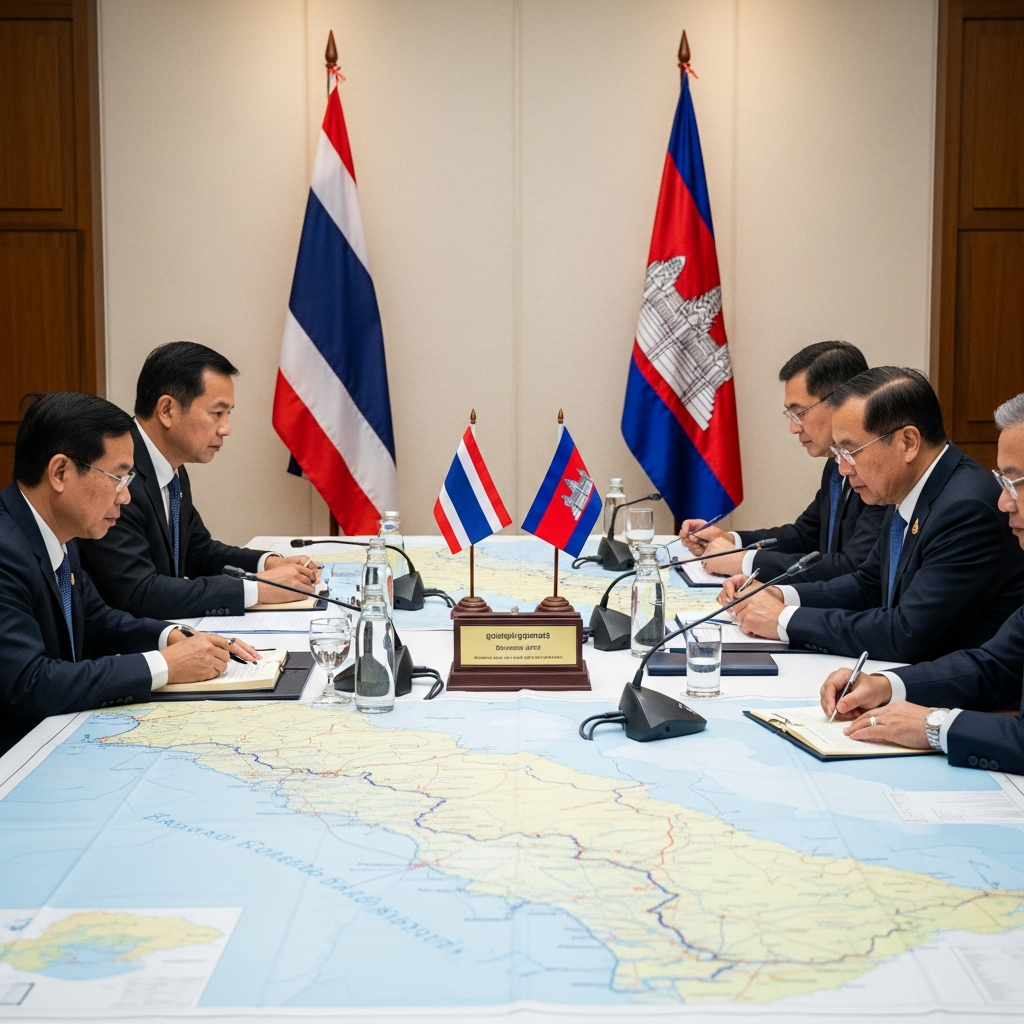In a pivotal diplomatic shift, the United Kingdom has announced its intention to recognize a Palestinian state by September 2025. This significant decision hinges on Israel’s commitment to a Gaza ceasefire and substantive steps towards a lasting peace. British Prime Minister Keir Starmer’s declaration signals a critical reorientation in UK foreign policy. It aims to revitalize the long-sought two-state solution amid escalating humanitarian concerns in the region. This bold stance aligns with growing international pressure for an end to the Israel-Hamas conflict.
The UK’s Conditional Recognition: A Turning Point
British Prime Minister Keir Starmer confirmed on Tuesday, July 29, 2025, that the UK will recognize the State of Palestine. This historic move is slated for the United Nations General Assembly in September. However, this recognition is not unconditional. It depends entirely on specific actions taken by the Israeli government to de-escalate the “appalling situation” in Gaza and genuinely commit to peace.
Prime Minister Starmer’s Rationale
Starmer emphasized his longstanding support for negotiations to establish a Palestinian state alongside Israel. He views this as the cornerstone of resolving the Israeli-Palestinian conflict. “With that solution now under threat, this is the moment to act,” Starmer stated. His strong stance reflects a belief that Palestinian statehood is an “inalienable right.” He described the “continued captivity of hostages,” “starvation and denial of humanitarian aid,” “increasing violence from extremist settler groups,” and “Israel’s disproportionate military escalation in Gaza” as “all indefensible.” This new policy also fulfills a pledge made in Starmer’s Labour Party’s 2024 election-winning manifesto, reflecting increasing domestic and international pressure for change.
Key Conditions for Israel
The UK’s recognition is contingent upon Israel fulfilling several critical conditions. These include:
Agreeing to an immediate ceasefire in Gaza.
Taking substantive steps to end the humanitarian crisis.
Committing to a long-term, sustainable peace framework.
Reviving the prospect of a two-state solution.
Allowing the UN to restart vital aid supplies to Gaza.
A clear commitment that there will be “no annexations in the West Bank.”
Demands on Hamas
While putting pressure on Israel, Prime Minister Starmer also issued clear demands to Hamas. Hamas is the militant and political organization that governs Gaza. Starmer called for the immediate release of all hostages seized during the October 7, 2023, attack on Israel. He further urged Hamas to “sign up to a ceasefire, disarm and accept they will play no part in the government of Gaza.” The UK government plans a final assessment of steps taken by both parties before the September UNGA meeting.
Global Diplomatic Ripple Effects
The UK’s announcement follows a similar declaration from French President Emmanuel Macron. Last week, Macron stated France’s intention to recognize a Palestinian state in September at the UN General Assembly in New York. This dual commitment from two major Western powers signifies a notable shift in international diplomacy. Over 140 countries globally, including several European nations like Ireland, Norway, and Spain, already recognize Palestinian statehood. However, the UK and France would be the most significant Western powers and members of the Group of Seven (G7) leading economies to do so.
A Broader European Shift?
The coordinated actions of the UK and France could catalyze a broader re-evaluation of Palestinian statehood across Europe. This push marks a departure from the previous Western stance, which often held that formal recognition should occur only as part of a negotiated peace deal. The move indicates a growing consensus among European nations that diplomatic pressure, including recognition, is necessary to push for a two-state solution. Such a shift could stimulate similar conversations in other nations, including Canada, and potentially isolate the U.S. as the primary major power exclusively backing Israel.
Escalating Humanitarian Crisis in Gaza
The urgency of the UK’s announcement is directly linked to the dire humanitarian situation in the Gaza Strip. Nearly 22 months into the conflict between Israel and Hamas, international alarm has reached unprecedented levels. The war began with a Hamas-led attack on Israel on October 7, 2023. This prompted a full-scale Israeli military invasion of Gaza.
Famine Warnings and Casualties
A United Nations-backed food security group issued a stark warning on the same day as Starmer’s speech. They indicated that a “worst-case scenario of famine” is unfolding across the territory. The number of Palestinians killed by Israeli forces in the war has tragically surpassed 60,000, according to Gaza’s Health Ministry. The UK, alongside France and Germany, has publicly criticized Israel for impeding humanitarian aid. Starmer has committed the UK to joining Jordan-led airdrop missions to deliver aid to the besieged enclave.
International Reactions and Implications
Britain’s move to recognize Palestinian statehood quickly drew strong reactions from key international players.
Israel’s Strong Opposition
The Israeli government swiftly condemned Britain’s position. Israel’s Foreign Ministry issued a statement asserting that this shift “constitutes a reward for Hamas.” It argued that such recognition “harms efforts to achieve a ceasefire in Gaza and a framework for the release of hostages.” This response mirrors Israel’s reaction to France’s earlier announcement, which Prime Minister Benjamin Netanyahu labeled a “grave mistake.”
U.S. Perspectives: Diverging Views
Reactions from the United States have been nuanced. Following a meeting between Starmer and former U.S. President Donald Trump in Scotland, Trump maintained a neutral stance. When asked about Starmer’s potential recognition, Trump stated he was primarily focused on addressing the humanitarian crisis and getting people fed. He publicly diverged from Israeli Prime Minister Benjamin Netanyahu regarding the severity of the hunger crisis in Gaza, asserting that there was “real starvation stuff.” Trump also highlighted U.S. aid efforts. Conversely, U.S. Secretary of State Marco Rubio criticized France’s earlier decision, labeling it “reckless” and serving “Hamas propaganda.” The U.S. State Department echoed this, describing such gestures as “counterproductive” to ongoing American diplomatic efforts in the Gaza conflict.
Practicalities of State Recognition
Dr. Julie Norman, an associate professor at UCL specializing in Middle Eastern politics, indicates that UK recognition would likely involve a vote at the United Nations. However, she notes that full UN recognition of Palestinian statehood is improbable due to a high likelihood of a US veto. Despite this, a vote for recognition by countries like the UK and France would be “significant” and of “value.” It signals a “strong moral commitment and stance to Palestine” and opens doors for future policy adjustments. Short-term effects might include the establishment of a Palestinian embassy in London.
Sir Vincent Fean, a former British consul general to Jerusalem, clarifies further practicalities. UK recognition would mean Palestinian passports are acknowledged by Britain. However, it would not alter the UK’s refugee system or its existing visa regime. Critically, recognition would not imply recognition of Hamas. The UK government recognizes states, not specific factions, and its proscription of Hamas as a terrorist group would remain unchanged.
The Path Ahead: Reviving the Two-State Solution
The renewed push for Palestinian statehood underscores the international community’s firm commitment to the two-state solution. This framework envisions an independent Palestinian state existing peacefully alongside Israel.
Historical Foundations of the Two-State Concept
The two-state solution traces its origins to the 1947 UN partition plan for the Holy Land. Although never fully implemented due to the 1948 war, the idea has been the foundation of peace talks since the 1990s. It is based on Israel’s pre-1967 boundaries, before it captured the West Bank, East Jerusalem, and Gaza in the Six-Day War. This concept enjoys wide international support as the most viable path to lasting peace and security for both Israelis and Palestinians.
Obstacles to Lasting Peace
Despite broad international consensus, significant obstacles remain. A primary impediment to the two-state solution is Israel’s creation and expansion of settlements in the Occupied West Bank. These settlements are widely considered illegal under international law. Their continued growth diminishes the contiguity and viability of a future Palestinian state. Addressing these deep-rooted issues will require sustained diplomatic efforts and a genuine commitment from all parties.
Frequently Asked Questions
What are the specific conditions for the UK’s recognition of a Palestinian state?
The UK’s recognition of a Palestinian state, planned for September 2025, is conditional on several actions by Israel. These include agreeing to a ceasefire in Gaza, ending the annexation of the West Bank, allowing the UN to restart humanitarian aid deliveries, and demonstrating a commitment to a long-term, sustainable peace that revives the two-state solution. Additionally, the UK demands Hamas release all hostages, disarm, agree to a ceasefire, and accept no future role in Gaza’s governance.
How does the UK’s potential recognition align with international efforts and the two-state solution?
The UK’s conditional recognition aligns with a broader international trend and reinforces global support for the two-state solution. It follows a similar announcement by France, signaling a significant shift among G7 nations. While over 140 countries already recognize Palestine, the UK and France’s moves are seen as crucial diplomatic pressure. This aims to push both sides towards a negotiated settlement, preventing the two-state solution from being sidelined and potentially isolating the U.S. as the sole major power backing Israel to the exclusion of Palestine.
What are the immediate practical implications of the UK recognizing Palestine?
Practically, the UK’s recognition would acknowledge Palestinian passports and could lead to the establishment of a Palestinian embassy in London. However, it would not alter the UK’s existing refugee system or visa regimes for Palestinian citizens. Importantly, recognizing Palestine as a state does not imply recognition of Hamas; the UK’s proscription of Hamas as a terrorist group would remain unchanged. While immediate on-the-ground changes in the conflict might be limited, it serves as a powerful diplomatic signal and moral commitment.
Conclusion
The United Kingdom’s conditional commitment to recognize a Palestinian state marks a significant pivot in its foreign policy. Driven by the dire humanitarian crisis in Gaza and the perceived threat to the two-state solution, Prime Minister Keir Starmer’s announcement places new pressure on both Israel and Hamas. This move, echoing France’s similar declaration, signals a broader European determination to foster lasting peace in the Middle East. As the September deadline approaches, the world will watch closely to see if these diplomatic efforts can translate into tangible steps towards a just and sustainable resolution for the Israeli-Palestinian conflict. The viability of the two-state solution hinges on the actions taken by all parties in the coming months.


